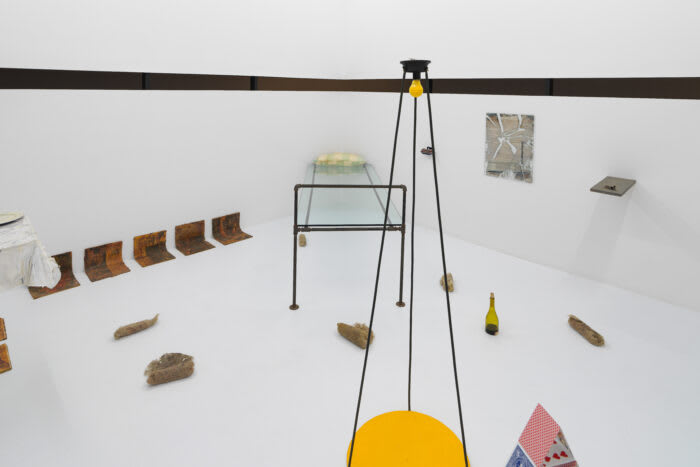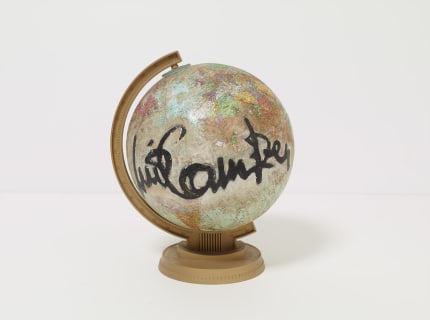Luis Camnitzer, a Uruguayan born in Germany but residing in New York since the middle 1960s, has opened a compelling show at Alexander Gray Associates, whose roster increasingly reflects a sharply social and political awareness. The exhibition’s artifacts are not many, but they are deeply affecting and oriented toward an awareness of the violent excesses of the Uruguayan dictatorship, active from 1973 to 1984. His art commands respect for its successful merger of memorable visuals, historical tenacity, and political insight. So the show keeps alive the memory of Camnitzer’s memory and his resistance to the Uruguayan government, at a distance but infused with a fierce intelligence and anger at the abuse of power that was occurring.
By far the most ambitious and affecting work in the show was El Mirador (1996), whose translation into English can mean “viewpoint” or, more concretely, “bay window,” both of which suggest the act of looking. In this troubling installation, part jail cell, part psychiatric dorm room, objects of all sorts surround the main element: a bed whose support is glass rather than a mattress. Visitors could look in on the small space by peering through a four-inch slit, open at eye level available on all sides of the installation’s outwardly black walls. We are now in a place where knowing the psychic state of one’s opponent is equivalent to winning the debate with that person, and the other elements in the environment attest to our need to control those we fear or don’t understand. Objects such as a mirror made of cracked glass, a house made of cards, a semi-filled wine bottle, a floor lamp with a yellow base and, at its apex, a yellow light–all are elements that don’t make sense and contribute to an air of menace, much as a dictatorship would.
Territorio Libre (2018), a more recent work, consists of a tight circle of razor wire surrounding the illuminated phrase “territorio libre”–or “free territory.” The irony of the piece is that we can’t tell if the wire is protecting us from enemies beyond it or enclosing us within. This is a telling visualization of the kind of damaged thinking directed at those who control us “for our own good.” The truth is, as the sculpture makes clear, control remains a constraint now matter how decorated it may be with false embellishments. Leer es resuscitar ideas (1992), whose English translation is “To read is to revive ideas,” is a manuscript of loose papers with writing on the first page, a quote by Simón Rodríquez. Like the other works in the show, it demonstrates the (futile?) awareness of the word’s ability to propound ideas unpopular to the spirit of the time. There is not much we can do about this, although the artifacts constructed by so committed a moralist as Camnitzer lead us in the direction of anger, given our historical knowledge.
What can be done? Not much, history tells us. History is a narrative of violence, of things being done to people. Camnitzer doesn’t name names so much as make the apparatus of terror visible, even if, in his case, they are obliquely expressed. We can no longer assign to the future examples of this obsessive spying; current climates in major states such as China and also America make it clear totalitarian politics is winning the argument. Thus, we are lucky to have visionaries like Camnitzer, who was far ahead of us some time ago, when we should have been more aware of Uruguay’s claustrophobic political atmosphere.
...
Read review at artefuse.com

